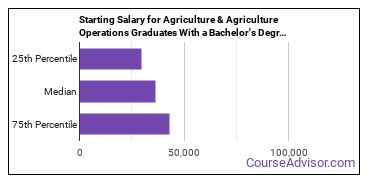Agriculture
Featured schools near , edit
Types of Degrees Agriculture Majors Are Getting
The following table lists how many agriculture and agriculture operations graduations there were in 2020-2021 for each degree level.
| Education Level | Number of Grads |
|---|---|
| Bachelor’s Degree | 22,108 |
| Associate Degree | 10,491 |
| Basic Certificate | 4,975 |
| Undergraduate Certificate | 4,794 |
| Doctor’s Degree | 4,273 |
| Master’s Degree | 2,949 |
| Graduate Certificate | 309 |
What Agriculture Majors Need to Know
People with careers related to agriculture and agriculture operations were asked what knowledge areas, skills, and abilities were important for their jobs. They weighted these areas on a scale of 1 to 5 with 5 being the highest.
Knowledge Areas for Agriculture & Agriculture Operations Majors
Agriculture and Agriculture Operations majors often go into careers in which the following knowledge areas are important:

- English Language - Knowledge of the structure and content of the English language including the meaning and spelling of words, rules of composition, and grammar.
- Customer and Personal Service - Knowledge of principles and processes for providing customer and personal services. This includes customer needs assessment, meeting quality standards for services, and evaluation of customer satisfaction.
- Administration and Management - Knowledge of business and management principles involved in strategic planning, resource allocation, human resources modeling, leadership technique, production methods, and coordination of people and resources.
- Mathematics - Knowledge of arithmetic, algebra, geometry, calculus, statistics, and their applications.
- Education and Training - Knowledge of principles and methods for curriculum and training design, teaching and instruction for individuals and groups, and the measurement of training effects.
Skills for Agriculture & Agriculture Operations Majors
agriculture and agriculture operations majors are found most commonly in careers in which the following skills are important:

- Active Listening - Giving full attention to what other people are saying, taking time to understand the points being made, asking questions as appropriate, and not interrupting at inappropriate times.
- Critical Thinking - Using logic and reasoning to identify the strengths and weaknesses of alternative solutions, conclusions or approaches to problems.
- Speaking - Talking to others to convey information effectively.
- Reading Comprehension - Understanding written sentences and paragraphs in work related documents.
- Monitoring - Monitoring/Assessing performance of yourself, other individuals, or organizations to make improvements or take corrective action.
Abilities for Agriculture & Agriculture Operations Majors
As a agriculture and agriculture operations major, you will find yourself needing the following abilities:

- Oral Expression - The ability to communicate information and ideas in speaking so others will understand.
- Oral Comprehension - The ability to listen to and understand information and ideas presented through spoken words and sentences.
- Problem Sensitivity - The ability to tell when something is wrong or is likely to go wrong. It does not involve solving the problem, only recognizing there is a problem.
- Written Comprehension - The ability to read and understand information and ideas presented in writing.
- Near Vision - The ability to see details at close range (within a few feet of the observer).
What Can You Do With a Agriculture Major?
Below is a list of occupations associated with agriculture and agriculture operations:
Who Is Getting a Bachelor’s Degree in Agriculture?
Racial-Ethnic Diversity
At the countrywide level, the racial-ethnic distribution of agriculture and agriculture operations majors is as follows:

| Race/Ethnicity | Number of Grads |
|---|---|
| Asian | 654 |
| Black or African American | 927 |
| Hispanic or Latino | 2,525 |
| White | 16,079 |
| International Students | 658 |
| Other Races/Ethnicities | 1,265 |
Geographic Diversity
Students from other countries are interested in Agriculture & Agriculture Operations, too. About 3.0% of those with this major are international students.
How Much Do Agriculture Majors Make?
Bachelor’s Degree Starting Salary
The median starting salary of students who graduated in 2017-2019 with a bachelor’s degree in agriculture and agriculture operations was $36,392 per year. These stats come from the U.S. Department of Education. During this timeframe, most salaries fell between $29,504 (25th percentile) and $43,205 (75th percentile).

Note that some of these people may have jobs that are not directly related to a agriculture and agriculture operations degree.
Salaries According to BLS
Average salaries range from $44,170 to $67,690 (25th to 75th percentile) for careers related to agriculture and agriculture operations. This range includes all degree levels, so you may expect those with a more advanced degree to make more while those with less advanced degrees will typically make less.
To put that into context, according to BLS data from the first quarter of 2020, the typical high school graduate makes between $30,000 and $57,900 a year (25th through 75th percentile). The average person with a bachelor’s degree (any field) makes between $45,600 and $99,000. Advanced degree holders make the most with salaries between $55,600 and $125,400.
Amount of Education Required for Careers Related to Agriculture
Some degrees associated with agriculture and agriculture operations may require an advanced degree, while others may not even require a bachelor’s in the field. Whatever the case may be, pursuing more education usually means that more career options will be available to you.
How much schooling do you really need to compete in today’s job market? People currently working in careers related to agriculture and agriculture operations have obtained the following education levels.

| Education Level | Percentage of Workers |
|---|---|
| Less than a High School Diploma | 5.5% |
| High School Diploma - or the equivalent (for example, GED) | 21.6% |
| Post-Secondary Certificate - awarded for training completed after high school (for example, in agriculture or natural resources, computer services, personal or culinary services, engineering technologies, healthcare, construction trades, mechanic and repair technologies, or precision production) | 11.5% |
| Some College Courses | 6.2% |
| Associate’s Degree (or other 2-year degree) | 8.6% |
| Bachelor’s Degree | 24.4% |
| Post-Baccalaureate Certificate - awarded for completion of an organized program of study; designed for people who have completed a Baccalaureate degree but do not meet the requirements of academic degrees carrying the title of Master. | 1.2% |
| Master’s Degree | 7.7% |
| Post-Master’s Certificate - awarded for completion of an organized program of study; designed for people who have completed a Master’s degree but do not meet the requirements of academic degrees at the doctoral level. | 0.9% |
| First Professional Degree - awarded for completion of a program that: requires at least 2 years of college work before entrance into the program, includes a total of at least 6 academic years of work to complete, and provides all remaining academic requirements to begin practice in a profession. | 0.4% |
| Doctoral Degree | 9.9% |
| Post-Doctoral Training | 2.7% |
Online Agriculture Programs
In 2020-2021, 964 schools offered a agriculture and agriculture operations program of some type. The following table lists the number of programs by degree level, along with how many schools offered online courses in the field.
| Degree Level | Colleges Offering Programs | Colleges Offering Online Classes |
|---|---|---|
| Certificate (Less Than 1 Year) | 0 | 0 |
| Certificate (1-2 years) | 593 | 17 |
| Certificate (2-4 Years) | 34 | 0 |
| Associate’s Degree | 1,338 | 39 |
| Bachelor’s Degree | 69 | 26 |
| Post-Baccalaureate | 0 | 0 |
| Master’s Degree | 442 | 36 |
| Post-Master’s | 23 | 0 |
| Doctor’s Degree (Research) | 281 | 2 |
| Doctor’s Degree (Professional Practice) | 35 | 0 |
| Doctor’s Degree (Other) | 0 | 0 |
Is a Degree in Agriculture Worth It?
The median salary for a agriculture and agriculture operations grad is $53,370 per year. This is based on the weighted average of the most common careers associated with the major.
This is 34% more than the average salary for an individual holding a high school degree. This adds up to a gain of about $269,400 after 20 years!

Top Ranking Lists for Agriculture
Explore Major by State
Alabama
California
District of Columbia
Idaho
Kansas
Maryland
Mississippi
Nevada
New York
Oklahoma
South Carolina
Utah
West Virginia
Alaska
Colorado
Florida
Illinois
Kentucky
Massachusetts
Missouri
New Hampshire
North Carolina
Oregon
South Dakota
Vermont
Wisconsin
Majors Related to Agriculture
You may also be interested in one of the following majors related to agriculture and agriculture operations.
| Major | Number of Grads |
|---|---|
| Computer & Information Sciences | 254,454 |
| Engineering | 198,468 |
| Biological & Biomedical Sciences | 177,778 |
| Engineering Technologies | 85,188 |
| Mathematics & Statistics | 52,396 |
| Physical Sciences | 50,306 |
| Natural Resources & Conservation | 30,503 |
| Architecture & Related Services | 17,325 |
| Communications Technologies & Support | 14,826 |
| Science Technologies / Technicians | 6,451 |
References
*The racial-ethnic minorities count is calculated by taking the total number of students and subtracting white students, international students, and students whose race/ethnicity was unknown. This number is then divided by the total number of students at the school to obtain the racial-ethnic minorities percentage.
- College Factual
- College Scorecard
- National Center for Education Statistics
- O*NET Online
- U.S. Bureau of Labor Statistics
- Usual Weekly Earnings of Wage and Salary Workers First Quarter 2020
- Image Credit: By W.carter under License
More about our data sources and methodologies.
Featured Schools
 Request Info
Request Info
|
Southern New Hampshire University You have goals. Southern New Hampshire University can help you get there. Whether you need a bachelor's degree to get into a career or want a master's degree to move up in your current career, SNHU has an online program for you. Find your degree from over 200 online programs. Learn More > |

